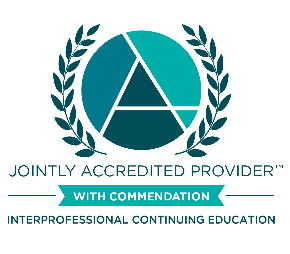A Resource for Healthcare and Social Services Professionals
Estimated time to complete: 1 hour
This training will provide overdose education and naloxone distribution strategies to address the current public health crisis. CEs: CME (1.00); Nursing (1.00), Pharmacology (0.75)
This training will provide overdose education and naloxone distribution strategies to address the current public health crisis.
This training satisfies 1.00 hours of the required 8 hours of training for DEA-registered practitioners. The Medication Access and Training Expansion (MATE) Act was included in the Consolidated Appropriations Act, 2023. The MATE Act requires increased training for Drug Enforcement Administration (DEA)-registered physicians and practitioners—specifically, a one-time eight-hour training requirement on treating and managing patients with opioid or other substance use disorders.
Medical professionals with prescriptive authority, nurses and support staff who support them looking to increase provision of care for patients with substance use disorder.
Other Faculty
Daniel P. Alford, MD, MPH, FACP, FASAM, CME Course Director, has no relevant financial relationships to disclose.
Colleen LaBelle, MSN, RN-BC, CARN Nursing Course Director, has no relevant financial relationships to disclose.
Members of the planning committee have no relevant financial relationships to disclose:
Ilana Hardesty, MA, Planning Committee
Victoria Rust, BS, Planning Committee
Jonathan Harris, PA-C
Jonathan Harris is a primary care provider at the Boston Healthcare for the Homeless Program, where he provides comprehensive medical care in shelter-based clinic and inpatient respite settings for patients with substance use disorders and complex co-occurring medical conditions. Jon also practices at Brigham and Women’s Hospital Medicine Unit and The Engagement Center, a low-threshold treatment and community-based program focused on improving the quality of life for persons experiencing addiction and/or homelessness. Jon cares for highly complex patients and responds to several overdoses daily. Jon previously worked in the nonmedical, nonprofit sector before finding his passion for medicine by volunteering as an EMT. He completed his PA studies at Northeastern University and holds a degree in environmental sciences from Columbia University.
Jonathan has no relevant financial relationships to disclose.
Following this training, participants will have the knowledge necessary to:
Boston Medical Center Grayken Center for Addiction Training and Technical Assistance, Massachusetts Department of Public Health, Bureau of Substance Addiction Services (DPH/BSAS)
Funding for out of state attendees is provided by the Opioid Response Network (ORN).
Funding for this initiative was made possible (in part) by grant no. 1H79TI081968 & 1H79TI085588-02 from SAMHSA. The views expressed in written conference materials or publications and by speakers and moderators do not necessarily reflect the official policies of the Department of Health and Human Services; nor does mention of trade names, commercial practices, or organizations imply endorsement by the U.S. Government.
 In support of improving patient care, Boston University Chobanian & Avedisian School of Medicine is jointly accredited by the Accreditation Council for Continuing Medical Education (ACCME), the Accreditation Council for Pharmacy Education (ACPE), and the American Nurses Credentialing Center (ANCC), to provide continuing education for the healthcare team.
In support of improving patient care, Boston University Chobanian & Avedisian School of Medicine is jointly accredited by the Accreditation Council for Continuing Medical Education (ACCME), the Accreditation Council for Pharmacy Education (ACPE), and the American Nurses Credentialing Center (ANCC), to provide continuing education for the healthcare team.
Continuing Medical Education (CME): Boston University Chobanian & Avedisian School of Medicine designates this enduring material for a maximum of 1.00 AMA PRA Category 1 Credit(s)™. Physicians should claim only the credit commensurate with the extent of their participation in the activity.
Nursing Contact Hours: 1.00 number of contact hours of which 0.75 are eligible for pharmacology credit.
This program expires on 12/31/2025
Requirements for Credit: To earn credit, one must complete the pre-test, video, and pass the post-test evaluation with a minimum score of 70%. The evaluation closes two weeks after watching the video.
Speaker/Planner Disclosures & Disclaimer
Boston University Chobanian & Avedisian School of Medicine asks all individuals involved in the development and presentation of Accredited Continuing Education activities to disclose all financial relationships with ineligible companies. This information is disclosed to all activity participants prior to the start of the educational activity. Boston University Chobanian & Avedisian School of Medicine has procedures to mitigate all relevant financial relationships with ineligible companies. In addition, faculty members are asked to disclose when any unapproved use of pharmaceuticals and devices is being discussed.
In accordance with the Standards for Integrity and Independence in Accredited Continuing Education, all relevant financial relationships that faculty, planners, authors, and anyone who may be in control of content have with ineligible companies have been mitigated.
Faculty members do not plan on discussing off-label/investigational uses of a commercial product.
THIS CONTINUING EDUCATION PROGRAM IS INTENDED SOLELY FOR EDUCATIONAL PURPOSES FOR QUALIFIED HEALTH CARE PROFESSIONALS. IN NO EVENT SHALL BOSTON UNIVERSITY BE LIABLE FOR ANY DECISION MADE OR ACTION TAKEN IN RELIANCE ON THE INFORMATION CONTAINED IN THE PROGRAM. IN NO EVENT SHOULD THE INFORMATION CONTAINED IN THE PROGRAM BE USED AS A SUBSTITUTE FOR PROFESSIONAL CARE. NO PHYSICIAN-PATIENT RELATIONSHIP IS BEING ESTABLISHED. IN NO EVENT SHOULD INFORMATION IN THE MATERIALS REGARDING LAWS, REGULATIONS, OR LEGAL LIABILITY BE CONSIDERED LEGAL ADVICE OR USED AS A SUBSTITUTE FOR CONSULTING WITH AN ATTORNEY.